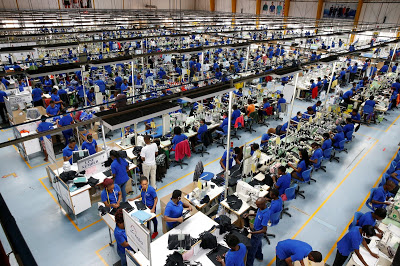The Federal Government has granted 12,000 expatriate quota licences to foreigners seeking to work in Nigeria, while treating 2,000 applications from companies.
Sola Fasure, the Media Adviser to the Minister of Interior, Rauf Aregbesola, disclosed this in a statement in Abuja.
According to Fasure, the minister stated this on the second day of the 6th edition of the Annual Kaduna Economic Investment, (KADINVEST), in Kaduna.
Aregbesola noted that from inception to date, the ministry had handled 14,690 companies and granted 126,893 quota licences to expatriates.
“From August 2019 till date, we have registered more than 2,000 companies, while over 12,000 expatriates have been given permits to work in Nigeria.
“We now handle applications with dispatch and will encourage any firm or organisation with genuine need for expatriates to bring their applications. We shall accord it the required courtesy”, he said.
The minister also reiterated the fact that Nigeria was still a good and profitable investment destination, in spite of its many security challenges.
”In spite of the challenges we have faced, it might interest us to know that Nigeria is still an investor’s dream.
“Where there is abundant raw materials, highly skilled and affordable workforce and the largest market for goods and services in Africa. The return on investment has always been mouth-watering”, the minister said.
He commended the Kaduna state government, the Nigerian Investment Promotion Commission (NIPC) and the Nigerian Economic Summit Group (NESG), for organising the summit as well as choosing the theme, ‘Towards a sustainable knowledge-based economy’.
Aregbesola said that the theme was a most fitting concept of the moment, especially given the paradigm shift from comparative advantage to competitiveness, knowledge and innovation would continue to drive businesses in the foreseeable future.
He, therefore, urged Nigerian entrepreneurs to invest in knowledge, innovation and cutting edge technologies for a better Nigeria.
“Looking at the history of economic development, we can see that there is a quantum leap in economic production at the onset of the Industrial Revolution circa 1760 in England, compared to what obtained in the feudal era.
“The introduction of machines and factory systems that enabled mass production of goods unleashed economic prosperity on the industrialised nations.
“Such that in a period of 50 years, it had created a yawning gap between them and the societies still trapped in feudal productions.
“Two and a half centuries down the line, the paradigm of production will be further altered spectacularly with advancement in knowledge altogether.
“Economic production in the immediate Industrial Revolution era had been built on the factors of nearness to raw materials and markets, among others.
“Therefore, the concept of comparative advantage is said to favour locales, where these factors count higher than others.
“A petroleum refinery under this outlook is said to be best sited near oil deposits, just as automobile factories are recommended to be sited near iron ore deposits. But all that has changed. the new idea now is competitiveness.
“This is the concept of where, how and which firms can best produce the same product qualitatively and at the best price, discounting the old notion of comparative advantage.
“Under competitiveness, companies with natural advantages can be bested by the ones with innovation, superior technology and superior knowledge of production, marketing and transportation factors that will combine to produce more qualitative goods at cheaper prices.
“This is actually a knowledge driven economic system in which knowledge is the dominant factor of production”, the minister also said.
The minister noted that the nexus was between security and the economy, stating that security was a critical factor in economic production and assured that the government was addressing the challenges faced by the country.
“No economic activity can take place successfully in an in secured environment. This is where government comes in.
“As we all know, we have had some security challenges in the past, but we are overcoming them and hopefully they will soon be a thing of the past, given government renewed onslaught on the problem.
“The environment must be enabling for business. The Federal Government is deeply concerned about national security and will spare no effort to secure lives, property and every inch of our territory.
“A cardinal objective of President Muhammadu Buhari’s administration is to improve considerably improve the ease of doing business and minimise, if not eliminate altogether, any hindrance to doing business in Nigeria.”
Nigeria grants 12,000 expatriates’ quota in two years
RELATED ARTICLES




